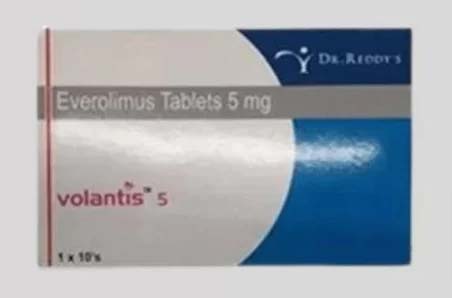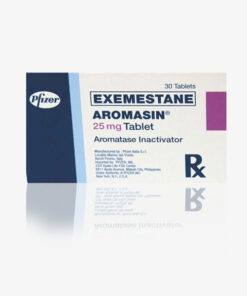-
×
 Buy Alphalan : Melphalan 2 Mg Tablets Online
1 × $59.05
Buy Alphalan : Melphalan 2 Mg Tablets Online
1 × $59.05
Buy Volantis : Everolimus 5 mg Tablets Online
$80.30
Brand Name : Volantis
Composition : Everolimus
Manufactured by : Dr. Reddy’s Laboratories Ltd.
Strength : 5 mg
Form : Tablet
Packing : Pack of 10 Tablets
Prescription Required *
SKU: 356285
Category: Anti Cancer
Tags: everolimus 10 mg price, everolimus 5 mg, everolimus mechanism of action, everolimus price, everolimus side effects, everolimus success rate, everolimus tablets, everolimus warnings, Volantis : Everolimus 5 mg Tablets costs, Volantis : Everolimus 5 mg Tablets price
Volantis is a prescription medication used in the treatment of various types of cancer. It contains the active ingredient Everolimus, which is a type of kinase inhibitor that works by blocking the activity of certain enzymes that promote cell growth and division.
Uses:
Volantis is used to treat:
– Advanced breast cancer
– Advanced renal cell carcinoma
– Pancreatic neuroendocrine tumors
HOW TO USE:
Volantis tablets should be taken orally, with or without food. The recommended dose is usually one tablet taken once daily, at the same time each day. The tablets should be swallowed whole with a glass of water.
Storage Conditions:
Volantis should be stored in a cool, dry place below 25°C (77°F). Keep it away from direct sunlight, heat, and moisture. Ensure that the medication is kept out of reach of children and pets.
Mechanism of action:
Volantis contains the active ingredient Everolimus, which is a type of kinase inhibitor that works by blocking the activity of certain enzymes that promote cell growth and division. Everolimus targets a specific protein known as mTOR, which is involved in cell growth and division. By blocking mTOR, Everolimus slows down or prevents the growth of cancer cells.
Precautions:
– Volantis may cause an increase in blood sugar levels, so patients with diabetes should monitor their blood sugar levels regularly.
– Volantis may increase the risk of infections, so patients should avoid contact with people who are sick or have infections.
– Patients may experience fatigue, dizziness, or confusion, so they should avoid activities that require focus and alertness.
– Patients with a history of liver problems must undergo regular liver function tests while on Volantis therapy.
Contraindications:
Volantis is contraindicated for patients who:
– Are allergic to Everolimus or any of its ingredients
– Have a history of angioedema (swelling of face, lips, tongue, or throat)
– Are pregnant or breastfeeding
Drug Interactions:
Volantis may interact with other medications and affect their effectiveness or increase the risk of side effects. Patients should inform their doctor if they are taking any prescription or over-the-counter medications, vitamins, or herbal supplements.
Overdose:
In the event of an overdose, patients should seek immediate medical attention. Symptoms of overdose may include chest pain, difficulty breathing, and unconsciousness.
Side Effects:
Volantis may cause side effects, which may vary from mild to severe. Common side effects include:
– Mouth ulcers
– Nausea
– Diarrhea
– Fatigue
Less common but serious side effects include:
– Increased risk of infections
– Interstitial lung disease
– Anaphylaxis (severe allergic reaction)
– Hepatotoxicity (liver problems)
Patients should inform their doctor immediately if they experience any serious or persistent side effects.
Be the first to review “Buy Volantis : Everolimus 5 mg Tablets Online” Cancel reply
Related products
Anti Cancer
$81.48
Anti Cancer
$679.03
$147.61
$177.14
$148.80
Anti Cancer
$93.89
Anti Cancer
$59.05
$64.95













Reviews
There are no reviews yet.